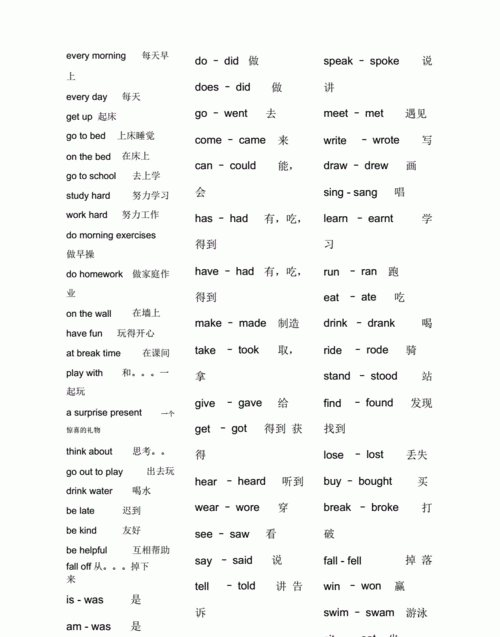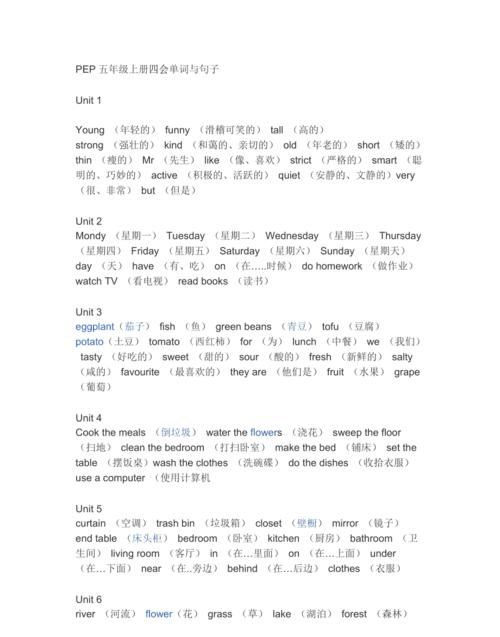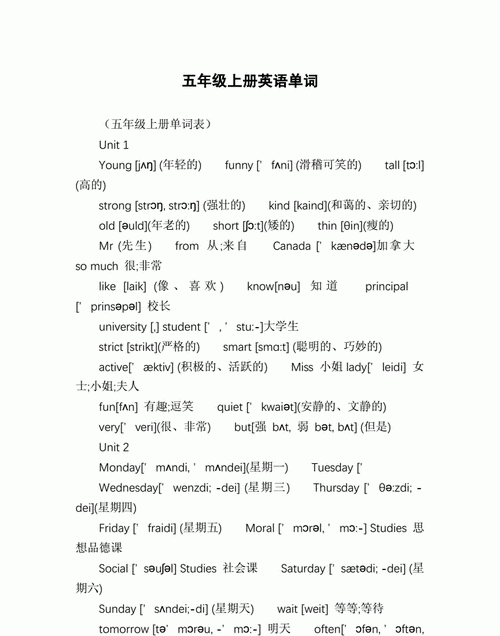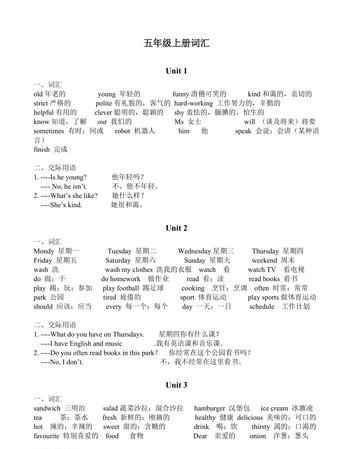本文目录
五年级下册英语单词人教版电子书
我们知道学生在不同的年级学习的教材都是不一样的,小学五年级的学生就需要学习人教版五年级课本,每个单元的课文都会有一些英语单词需要大家背诵,专家建议大家在上课之前就把五年级英语单词整理在一起,等到开课之前提前背诵一下,这样能够及时熟悉课文,等到真正上课的时候就不吃力了,下面就为大家总结一下五年级英语单词。
五年级英语单词上册
五年级英语单词Unit1
his他的 her她的 their他(她,它)们的 twins孪生子,双胞胎 blond金黄色的
curly卷曲的 slim苗条的 straight直的 freckles雀斑 talkative健谈的,多嘴的
honest诚实的 careless粗心的 popular受欢迎的hardworking刻苦的 shy害羞的
lazy懒惰的 quiet文静的 helpful乐于助人的 friendly友善的
funny有趣的,滑稽可笑的
Unit 2
than比,比较 short短的,矮的 old年长的,旧的 long长的 small小的
better (Good和well的比较级)更好的(地) fast快的,快地 hard刻苦地,努力地
五年级英语单词Unit 3
pretty漂亮的 ugly丑陋的 thick厚的 thin薄的,瘦的
best (Good和well的最高级)最好的(地)
Unit4
notebook笔记本 stapler订书器 glue stick胶棒 disk磁盘 whiteout涂改液
backpack背包 pencil case文具盒 brush毛笔 folder文件夹sticker不干胶贴片
expensive昂贵的 cheap便宜的 a pair of一双(把,幅,条).. running shoes跑鞋,运动鞋
size尺寸 a good deal公平交易 these这些 try…on试穿…
them他们,她们,它们 fit适合
Unit 5
oil油 bowl碗 plate盘子 wok锅 wash洗 crack敲碎 mix混合
put放,摆 add加 salt盐 serve将(饭菜)摆上桌 stir-fry (用旺火)快炒
stir-fry vegetables用旺火炒的菜 cucumber黄瓜 soy sauce酱油
sauce酱,调味品 vinegar醋 sugar糖 pepper胡椒(粉)
Unit 6
children儿童 show节目 report报告 entertainment娱乐节目 nature自然
Peking opera京剧 movie电影 commercial(电视或无线电中的)广告 kind of种(类)
think of想,认为 channel频道 schedule时间表,一览表 Cartoon City (节目名称)动画城
Magic Earth (节目名称)神奇地球 quiz答问比赛,智力测验
Animal World (节目名称)动物世界 comedy喜剧 Artist’s Life (节目名称)艺术人生

五年级下册英语单词词汇表
单词是英语考试经常遇到的,牢记英语单词是学习英语必背的方法,下面就是小编为大家整理的五年级英语必背单词归纳,希望对大家有所帮助!
五年级上册必会单词词汇表
Unit 1
Young(年轻的) funny(滑稽可笑的) tall(高的) strong(强壮的)
kind(和蔼的、亲切的) old(年老的) short(矮的) thin(瘦的) Mr(先生) like(像、喜欢) strict(严格的) smart(聪明的、巧妙的) active(积极的、活跃的) quiet(安静的、文静的) very(很、非常) but(但是)
Unit 2
Mondy(星期一) Tuesday(星期二) Wednesday(星期三) Thursday(星期四)
Friday(星期五) Saturday(星期六) Sunday(星期天) day(天) have(有、吃) on(在…..时候) do homework(做作业) watch TV(看电视) read books(读书)
Unit 3
eggplant(茄子) fish(鱼) green beans(青豆) tofu(豆腐) potato(土豆)
tomato(西红柿) for(为) lunch(中餐) we(我们) tasty(好吃的) sweet(甜的) sour(酸的) fresh(新鲜的) salty(咸的) favourite(最喜欢的) they are(他们是) fruit(水果) grape(葡萄)
Unit 4
Cook the meals(倒垃圾) water the flowers(浇花) sweep the floor(扫地)
clean the bedroom(打扫卧室) make the bed(铺床) set the table (摆饭桌) wash the clothes(洗碗碟) do the dishes(收拾衣服) use a computer(使用计算机) Unit 5
curtain(空调) trash bin(垃圾箱) closet(壁橱) mirror(镜子) end table(床头柜) bedroom(卧室) kitchen(厨房) bathroom(卫生间) living room(客厅)
in(在…里面) on(在…上面) under(在…下面) near(在..旁边) behind(在…后边) clothes(衣服)
Unit 6
river(河流) flower(花) grass(草) lake(湖泊) forest(森林) path(路)
pake(公园) picture(照片) hourse(房子) bridge(桥) tree(树) road(公路) building(建筑物) clean(干净的)

五年级上册英语单词表
人教版小学英语·五年级上册·单词表
Unit 1
Young [jʌŋ] (年轻的) funny ['fʌni] (滑稽可笑的) tall [tɔ:l] (高的
strong [strɔŋ, strɔ:ŋ] (强壮的) kind [kaind] (和蔼的、亲切的) old [əuld] (年老的)
short [ʃɔ:t](矮的) thin [θin] (瘦的) Mr (先生) from 从;来自
Canada ['kænədə] 加拿大 like [laik] (像、喜欢) know [nəu] 知道
principal ['prinsəpəl] 校长 university [,ju:ni'və:səti] student ['stju:dənt, 'stu:-] 大学生 strict [strikt] (严格的) smart [smɑ:t] (聪明的、巧妙的) active['æktiv] (积极的、活跃的) Miss 小姐
lady['leidi] 女士;小姐;夫人 so much 很;非常 fun[fʌn] 有趣;逗笑
quiet ['kwaiət] (安静的、文静的) very['veri] (很、非常)
but[强 bʌt, 弱 bət, bʌt] (但是) Unit 2
Monday ['mʌndi, 'mʌndei]星期一)
Tuesday ['tju:zdi] 星期二 Wednesday ['wenzdi; -dei] (星期三)
Thursday ['θə:zdi; -dei] 星期四 Friday ['fraidi] 星期五
Moral ['mɔrəl, 'mɔ:-] Studies 思想品德课
Social ['səuʃəl] Studies 社会课 Saturday ['sætədi; -dei] 星期六 Sunday ['sʌndei; -di] 星期天
day [dei] 天 wait [weit] 等等;等待
tomorrow [tə'mɔrəu -'mɔ:-]明天 often ['ɔfən, 'ɔftən, 'ɔ:-] 经常
love [lʌv] 爱;热爱 have 有、吃 on 在…..时候 do homework 做作业 watch TV 看电视 read[ri:d] books 读书 Unit 3
cabbage[['kæbidʒ]] 洋白菜;卷心
菜
小学五年级全科目课件教案习题汇总语文数学英语
pork[pɔ:k] 猪肉 mutton['mʌtən] 羊肉
eggplant'eɡplɑ:nt,-plænt] 茄子 fish[fiʃ] 鱼
green[ɡri:n] beans[bi:n] 青豆 tofu 豆腐
potato[pə'teitəu 土豆 tomato[tə'mɑ:təu, -'mei-]西红柿 for 为
lunch [lʌntʃ] 中餐 we 我们
menu ['menju:, mə'nju:] 菜单 sound [saund] 听起来 Mew Mew 猫咪 healthy['helθi] 健康的 tasty ['teisti] 好吃的 sweet [[swi:t]] 甜的 sour ['sauə] 酸的 fresh [freʃ] 新鲜的 salty ['sɔ:lti] 咸的
favourite ['feivərit] 最喜欢的 they are 他们是 fruit [fru:t] 水果 grape [ɡreip] 葡萄 now [nau] 现在 have to 不得不 eat [i:t] 吃
Unit 4
empty ['empti] the trash [træʃ] 倒垃圾
cook the meals [mi:ls 烧饭 water the flowers ['flauə]浇花 sweep [swi:p] the floor [flɔ:] 扫地
clean [kli:n] the bedroom['bedru(:)m] 打扫卧室 helpful ['helpful] 有帮助的 at home 在家里 ill [il] 有病的
wash [wɔʃ, wɔ:ʃ] the windows ['windəu] 擦窗户
just [dʒʌst] do it 就这么干吧 do housework ['hauswə:k] 做家务
make [meik] the bed 铺床 set[set] the table 摆饭桌 wash [wɔʃ, wɔ:ʃ] the clothes[kləuðz] 洗衣服
do the dishes [diʃ] 洗碗碟 put away [ə'wei] the clothes 收拾衣服
have a try 试一试
robot['rəubɔt, -bət, 'rɔbət] 机器人
play [plei] chess[tʃes] 下棋
use [ju:z] a computer[kəm'pju:tə] 使用计算机 Unit 5
air-conditioner ['εəkən,diʃən] 空调
curtain ['kə:tən] 窗帘 trash bin 垃圾箱 closet ['klɔzit] 壁橱 mirror ['mirə] 镜子 end [end] table ['teibl] (床头柜) look at 看一看 own [əun] 自己的 flat [flæt] 公寓 third [θə:d] 第三的
bedroom ['bedru(:)m] 卧室 kitchen ['kitʃin] 厨房 bathroom ['bɑ:θrum] 卫生间 living ['liviŋ] room 客厅 in 在…里面 on 在…上面
under ['ʌndə] 在…下面 near [niə] 在..旁边 behind [bi'haind] 在…后边 over ['əuvə] 在…上面 clothes [kləuðz] 衣服 work [wə:k] 工作 tell [tel] 告诉;说
Unit 6
sky [skai] 天空 cloud [klaud] 云
mountain ['mauntin] 山;山脉 river ['rivə] 河流 flower ['flauə] 花 grass [ɡrɑ:s, ɡræs] 草 lake [leik] 湖泊 forest ['fɔrist] 森林 path [pɑ:θ, pæθ] 路 park [pɑ:k] 公园
nature ['neitʃə] park 自然公园 farm [fɑ:m] 农场 holiday ['hɔlədi] 假期 picture ['piktʃə] 照片 village ['vilidʒ] 乡村;村庄 city ['siti] 城市
house [haus, hauz] 房子 bridge [bridʒ] 桥 tree [tri:] 树 road [rəud] 公路 building ['bildiŋ] 建筑物 clean [kli:n] 干净的 air [εə] 空气 run 跑;奔跑
any ['eni] 任何的;所有的

五年级上册英语单词有哪些?
英语五年级上册单词词汇表,拿走吧
Unit 1:
young 年轻的 funny 滑稽可笑的 tall 高的
strong 强壮的 kind 和蔼的、亲切的;
old 年老的 short矮的 thin 瘦的 Mr 先生
like 像、喜欢 strict 严格的 smart 聪明的
active 积极的、活跃的 quiet 安静的、文静的
very 很、非常 but 但是
Unit 2:
Monday 星期一 Tuesday 星期二 Wednesday 星期三
Thursday星期四 Friday 星期五 Saturday 星期六
Sunday 星期天 day 天 have 有、吃
on 在…..时候
do homework 做作业 watch TV 看电视 read books 读书
Unit 3:
eggplant 茄子 fish 鱼 green beans 青豆 tofu 豆腐
potato 土豆 tomato 西红柿 for 为 lunch 中餐
we 我们 tasty 好吃的 sweet 甜的 sour 酸的
fresh 新鲜的 salty 咸的 favourite 最喜欢的
they’re=they are 他们是 fruit 水果 grape 葡萄
Unit 4:
cook the meals 做饭 water the flowers 浇花
sweep the floor 扫地
clean the bedroom 打扫卧室 make the bed 铺床
set the table 摆饭桌
wash the clothes 洗衣服 do the dishes洗碗碟
use a computer 使用计算机
Unit 5:
curtain 窗帘 trash bin 垃圾箱 closet 壁橱
mirror 镜子 end table 床头柜 bedroom 卧室
kitchen 厨房 bathroom 卫生间 living room 客厅
in 在…里面 on 在…上面 under 在…下面
near 在..旁边 behind 在…后边 clothes 衣服
Unit 6:
river 河流 flower 花 grass 草 lake 湖泊
forest 森林 path 路 park 公园 picture 照片
house 房子 bridge 桥 tree 树 road 公路
building 建筑物 clean 干净的
五年级上册四会句子:
Unit 1:
1.谁是你的英语老师?Carter先生。 Who’s your English teacher? Mr Carter.
2.他长得什么样?他(是)高而强壮。 What’s he like ? He’s tall and strong .
3.她很安静吗?不是的。她很活跃的。 Is she quiet ? No, she isn’t. She’s very active.
4.她很严格么?是的,但她很和蔼的。 Is she strict ? Yes, she is , but she’s very kind .
Unit 2:
1. 今天星期几?星期二。 What day is it today ? It’s Tuesday.
2. 星期二你们上什么课? What do you have on Tuesdays ?
我们上数学和科学课。 We have math and science.
3. 星期六你常常干些什么? What do you do on Saturdays ?
我看电视做作业。 I watch TV and do homework.
4. 你怎么样? 我也做作业。 What about you ? I do my homework, too.
Unit 3:
1.星期一你们午饭吃什么? What do you have for lunch on Mondays ?
我们吃西红柿,土豆和鱼. We have tomatoes, potatoes and fish .
2.你(的)最喜欢的水果是什么? What’s your(her她的、his他的)favourite fruit ?
我喜欢苹果. 它们甜甜的. I like apples . They are sweet.
3.我喜欢水果. 但是我不喜欢葡萄. 它们酸酸的。I like fruits. But I don’t like grapes. They’re sour.
4.星期三你午饭吃什么? What do you have for lunch on Wednesday ?
我吃米饭,猪肉和豆腐. I have rice,pork and tofu .
Unit 4:
1.你会干什么? 我会做饭。 What can you do ? I can cook the meals.
2. 你会铺床吗? 不,我不会。 Can you make the bed ? No, I can’t.
3. 你会扫地吗? 是的,我会。 Can you sweep the floor ? Yes, I can.
Unit 5:
1. 衣橱在桌子旁边。 The closet is near the table.
2. 许多衣服在衣橱里。 Many clothes are in the closet.
3. 垃圾箱在门后。 The trash bin is behind the door.
4. 我房间里有一面镜子,两把椅子和一个大衣橱。There is a mirror, two chairs and a big closet.
5. 我家里有两间卧室,一间厨房和一间客厅。There are two bedrooms, a kitchen and a living room.
Unit 6:
1. 公园里面有一个森林吗?是的,有。 Is there a forest in the park? Yes, there is.
2. 有一条河吗?不,没有。 Is there a river? No, there isn’t.
3. 山里有熊猫吗? 不,没有。 Are there any pandas in the mountains? No, there aren’t.
4. 河里有鱼吗? 是的,有。 Are there any fish in the river? Yes, there are. (fish单复数一样)
五年级上册主要知识点
Unit 1:
1、反义词:tall—short long—short young—old new—old strong—thin fat—thin
kind—strict active—quiet
2、What’s …like?是问某某长得什么样子,它的答语一般用:He/She/ It is…(后面跟描写人的外貌特征的词语),如:What’s your father like?你爸爸长得什么样子?
3、表示“一个”有a, an. a, e, i,o, u开头一般用an,例如an old\active lady.
Unit 2:
1、表示星期几的七个单词,开头第一个字母都要大写。
2、on+星期。如on Monday, on Sunday . 表示在几点几分,在具体时间时,用at. 如at 6:30。
3、I like Sundays.是泛指所有的星期日,所以用复数形式。like+复数。
Unit 3:
1、What would you like for lunch? 你午饭想吃什么?“for”:为了。后面要接名词或人称代词的宾格形式。 如:I’d like some tomatoes and mutton.我想吃一些西红柿和羊肉。I’d=I would
一日三餐的英语说法: breakfast 早饭 lunch 午饭 dinner 晚饭
西红柿 tomato 和土豆 potato 复数形式在后面加es tomatoes, potatoes
2、下列单词的形容词形式:salty (咸的) healthy(健康的) tasty(好吃的)
3、What’ s your favorite food? 后面一般都跟集合的名词:food 食物 fruit水果 drink饮料 colour颜色 class 课程 book 书 sport 运动 vegetable 蔬菜 number数字 day天
Unit 5/6:
1.There be包括There is a …后面跟名词单数,表示一个。例如:There is a mirror on the wall. 后面跟名词复数,表示多个。例如: There are two end tables near the bed.
2.on与over的区别: 都是在…上面on:与下面的物体紧挨着。over:与物体没有接触,悬空着。
3. 一些特殊疑问词的意义与用法:
1) what 什么,叫什么,干什么等。例如:What’s this? 这是什么? What’s your name? 你的名字是什么? What’s your father like? 你爸爸长得什么样子?
2)where 哪里,用来问在什么地方,如Where are you from? 你来自哪里?
3)how many 多少。用来问物体的数量。如:How many books do you have? 你有多少本书?

以上就是关于五年级上册英语单词归纳 ,五年级下册英语单词人教版电子书的全部内容,以及五年级上册英语单词归纳 的相关内容,希望能够帮到您。

